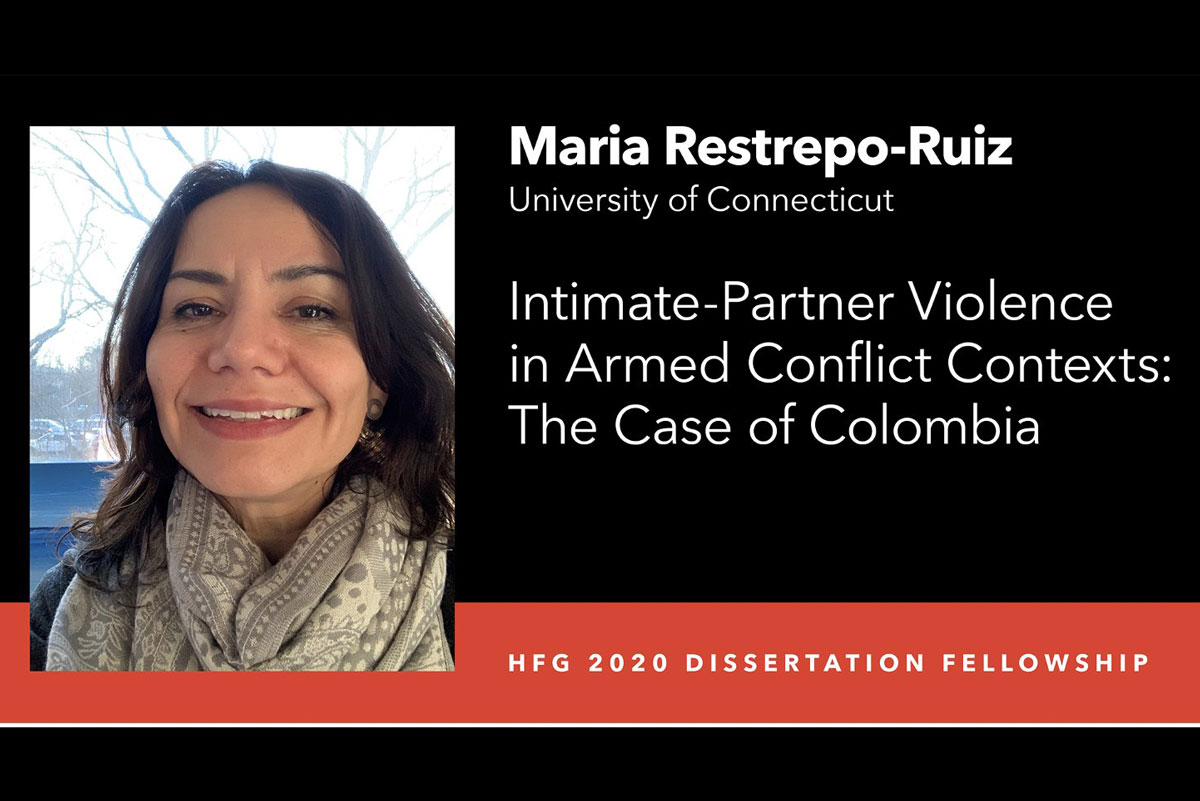As decades of political unrest and violence continue in her native Colombia, UConn public health sciences research associate and Ph.D. candidate Maria “Mayte” Restrepo-Ruiz is studying whether women are more likely to be victims of intimate partner violence in an environment of ongoing armed conflict.
Her work has unearthed disturbing accounts from Colombian women and has drawn the attention of the Harry Frank Guggenheim Foundation, an organization that provides research grants and fellowships to support the study of violence, aggression and dominance.
‘I hope my research will provide some material to understand that political violence affects not only the direct victims but society as a whole in ways that are not as visible or clear.’
Restrepo-Ruiz emerged from a rigorous global peer-review competition as one of nine scholars to be chosen as Harry Frank Guggenheim Foundation Dissertation Fellows for 2020.
“Colombia has one of the highest numbers of women who are assassinated by their partners in Latina America,” Restrepo-Ruiz says. “The question is, why? What is the difference with other countries? And the Guggenheim Fellowship, they focus on understanding the impact of violence and the impact of conflict, so they were very interested in the topic.”
Restrepo-Ruiz has interviewed nearly 50 women who’ve been displaced from other parts of Colombia to the capital city, Bogota. Because of COVID-19 she was not able to travel to Colombia as she had planned to conduct interviews with women who have been victims of the armed conflict. But she worked with community organizations during the summer to conduct the interviews via internet. Her dissertation’s focus is on the links between political violence and intimate partner violence as well as the mental health impacts on women who have experienced these types of violence, such as depression and post-traumatic stress disorder.
“Not all of the women I interviewed have experienced intimate partner violence, but the majority have, and the majority also associate an increase of violence from their partners during times of conflict or after the conflict,” Restrepo-Ruiz says. “There are not many studies around that. I’m looking at Colombia specifically, but I think that it applies to many countries.”
She also seeks to determine whether the presence of political violence and a culture of seeing violence as normal can lead to a justice system that is unable or unwilling to protect its citizens. She says while Colombia does have strong laws against intimate partner violence, they’re not reliably enforced, leaving an institutional framework that fails to support women’s rights to live free of violence.
“What peace requires is not just an agreement between the different forces, but also that individuals feel that they have safety,” Restrepo-Ruiz says. “What these women have said to me is that peace means safety, that they are safe outside the house, but also inside the house. And they don’t see that the justice system in Colombia is helping them to get there.”
The Guggenheim Foundation is providing $20,000 to help support the writing of her dissertation. Restrepo-Ruiz also received support from the UConn Human Rights Institute to conduct her research.
“I have had such support from my committee members, especially Jane Ungemack and Steve Schensul,” Restrepo-Ruiz says. “I have a large committee, too, and all of them are very supportive.”
Her work won’t stop with graduation, planned for May. Restrepo-Ruiz intends to work with human rights and women’s organizations in Colombia to disseminate her findings.
“Colombia is making efforts to implement a peace agreement that includes, among other things, a Truth Commission,” Restrepo-Ruiz says. “This commission has the goal of clarifying what has happened within the armed conflict for the victims and demonstrating the impact of the political violence for the country. I hope my research will provide some material to understand that political violence affects not only the direct victims but society as a whole in ways that are not as visible or clear.”
She also plans to continue studying mental health effects of political and domestic violence, particularly the systematic barriers in the justice system and their connection to mental health, including some Connecticut-based research with public health sciences faculty.



